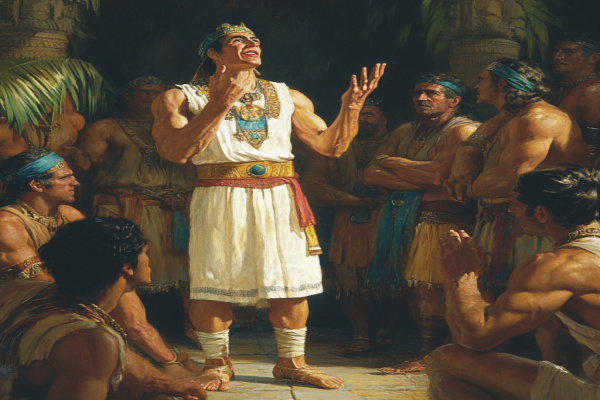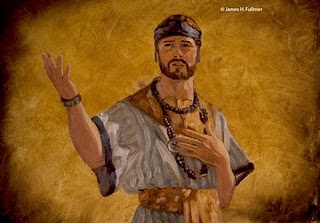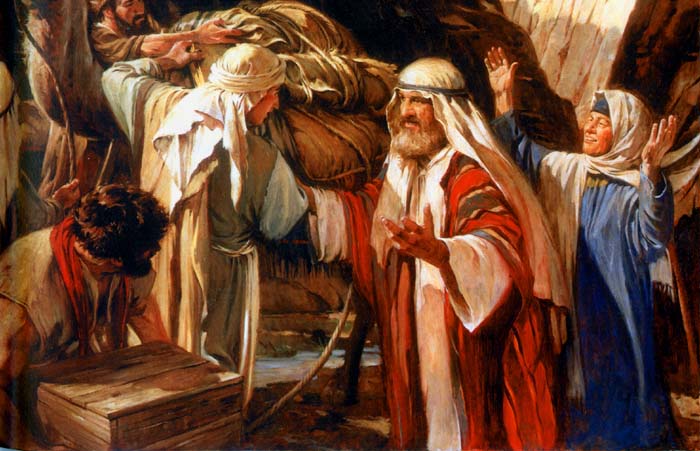Question
Gramps,
How did we know all the details of Abinadi’s death if Alma the Elder had fled before he died? Did he learn about it from another source? Or did Heavenly Father show it to him in a vision?
David
Answer
David,
The story of Abinadi, a prophet in the Book of Mormon, is one of courage, conviction, and the power of divine revelation. His martyrdom at the hands of King Noah and his wicked priests is a pivotal moment in Nephite history, emphasizing the importance of prophetic voices amidst opposition. Yet, how did the details of Abinadi’s death and his teachings survive, particularly when Alma the Elder, who fled before Abinadi’s execution, played a crucial role in their preservation?
Abinadi’s mission was marked by an unwavering commitment to proclaiming the word of God to a people steeped in sin. He boldly confronted King Noah and his priests, warning them of their wickedness and the impending consequences if they did not repent. His teachings included prophecies about the coming of Jesus Christ and the Atonement, which were met with hostility and disdain. Ultimately, Abinadi was sentenced to death for his declarations, stating, “I finish my message, and then it matters not whither I go, if it so be that I am saved” (Mosiah 13:9). This profound declaration not only reflected his faith but also his understanding of the eternal significance of his mission.
Abinadi’s martyrdom marked a significant turning point. As he faced execution, he entrusted his teachings to those who would listen, particularly Alma, a priest of King Noah who had begun to question the king’s ways. Despite his initial allegiance to the corrupt regime, Alma recognized the truth in Abinadi’s words and became a follower.
When Abinadi was condemned to death, Alma attempted to plead for his life. However, sensing the imminent danger, he fled, concealing himself from the king’s and his priests’ wrath. This pivotal moment did not end Abinadi’s influence; rather, it marked the beginning of Alma’s transformation. While in hiding, Alma took the critical step of recording all the words that Abinadi had spoken. Mosiah 17:4 states, “And he being concealed for many days did write all the words which Abinadi had spoken”. This act was not merely a historical account; it was an expression of faith and a commitment to uphold the truth amidst persecution.
Alma’s efforts to document Abinadi’s teachings were crucial. By recording these prophetic messages, he ensured that they would endure and guide future generations. His writings became foundational for the Church he later established, emphasizing the importance of repentance and faith in Christ. This transition from a priest of King Noah to a prophet and leader illustrates the transformative power of repentance and the necessity of adhering to prophetic counsel.
Abinadi’s messages, particularly concerning the Atonement and resurrection, resonate deeply within Latter-day Saint theology. His teachings provided a prophetic framework that Alma would build upon as he spread the gospel among the people. One of Abinadi’s key prophecies addresses the coming of Christ, emphasizing the significance of faith in Him for salvation: “And now if Christ had not come into the world, speaking of things to come as though they had already come, there could have been no redemption” (Mosiah 16:6). This encapsulates the essence of prophetic faith that Alma adopted and which became integral to the teachings he spread.
Through Alma’s diligent record-keeping and the profound impact of Abinadi’s teachings, the details of Abinadi’s death and messages were preserved, continuing to influence future generations of believers. Abinadi’s teachings concerning repentance and the coming of Christ are echoed throughout Latter-day Saint doctrine, illustrating the enduring significance of prophetic voices.
The narrative of Abinadi and Alma the Elder highlights the importance of prophetic testimony and the transformative power of faith. Despite the tragic death of Abinadi, his teachings endured through Alma’s faithful documentation, ensuring that the messages of repentance and the Atonement would guide the faithful for generations to come. This story serves as a reminder of the enduring power of truth and the necessity of following prophetic counsel. As members of The Church of Jesus Christ of Latter-day Saints reflect on these events, they are invited to consider how they too can uphold and share the eternal truths found in the gospel of Jesus Christ.
Gramps







